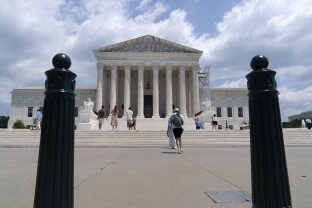Two key Supreme Court emergency rulings have set the stage for a massive expansion of presidential power and made the idea of an independent agency in government virtually obsolete.
Conservative legal scholars, who’ve embraced the unitary executive theory, are thrilled at what they see as a rebuke of the “administrative state,” even if it means a Democratic president in the future has more power too.
“Is there a risk of a blowback? Yes, because you’re increasing the overall responsiveness of government to the president, and so the next president will have more levers to deploy,” O. H. Skinner, a former Arizona solicitor general and longtime member of the Federalist Society, told NOTUS. “But it is bending the government to the right answer, which is if you build something this big, as in you build an administrative state that is this big and powerful, it resides under the president — and if you don’t like that, don’t build it so big.”
Proponents of the theory, including Trump’s closest advisers and Project 2025 authors, argue that the Constitution vests all executive power with the president, including over independent executive agencies created by Congress.
The Supreme Court’s three liberal justices are accusing their colleagues of stripping power away from Congress to set the parameters of independent agencies and handing that power over to the president without legal justification.
“The majority rejects Congress’s design of a whole class of agencies … by layering nothing on nothing,” Justice Elena Kagan wrote in her dissent to last week’s ruling last week allowing Trump’s removal of three Democrats from the Consumer Product Safety Commission to stand.
That majority opinion cited SCOTUS’ May decision that allowed the removal of the Democratic chair of the National Labor Relations Board to stand.
“The result — an increase of executive power at the expense of legislative authority — does not stand alone. Just last week, this Court granted another stay allowing the President to ignore a federal statute,” Kagan added, pointing to a separate ruling that allowed mass firings at the Department of Education.
Experts say the two rulings regarding independent agency officials were on an emergency basis, not on the merits of their firing, so the Supreme Court hasn’t formally overturned the 1935 legal precedent of Humphrey’s Executor, which limits the president’s power to fire independent agency officials.
“Based on these Supreme Court decisions — at least in the interim, I don’t think there’s a final ruling on that, but at least in the interim — there’s more power to get rid of someone even if the statute creating their term of office says that they should have tenure protection,” administrative law scholar Christine Chabot told NOTUS.
Trump also fired two officials at the Federal Trade Commission, the agency the Humphrey’s Executor ruling stems from, but the Supreme Court hasn’t yet ruled on their removals.
One of the Democratic commissioners, Rebecca Slaughter, was briefly reinstated by a lower court this month, before the decision was revoked by an appeals court. (The other fired commissioner, Alvaro Bedoya, dropped the case to take a new job.)
“The Federal Trade Commission has been protected from presidential politics for nearly a century,” Slaughter wrote in a statement after the appeals court ruling.
Critics argue that under the new political landscape SCOTUS is paving, “all roads lead to the White House,” heightening the incentive for political favors.
“Forget about the agencies legally responsible for decisions about tariffs, antitrust, bank and securities/commodities, communications, energy, environment, medical research, pharmaceuticals — they are irrelevant,” former banker and consultant Todd H. Baker wrote in the Financial Times. “The Supreme Court has turned them from independent arbiters bound by laws and expert-designed regulation into mere order takers for the Unitary Executive.”
The trend of emergency rulings sends a signal throughout the government of the judiciary’s willingness to side with Trump’s hammer if it comes down on them, Chabot said.
“Even if a particular member of an agency has not been removed yet,” she added, “the fact that they know the Trump administration is willing to use a strong removal power, that can hang over them like a Damocles.”
Sign in
Log into your free account with your email. Don’t have one?
Check your email for a one-time code.
We sent a 4-digit code to . Enter the pin to confirm your account.
New code will be available in 1:00
Let’s try this again.
We encountered an error with the passcode sent to . Please reenter your email.


